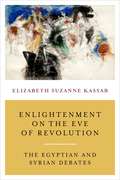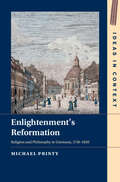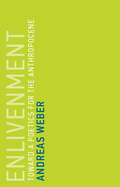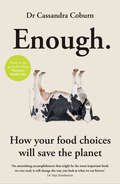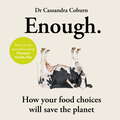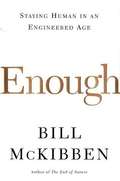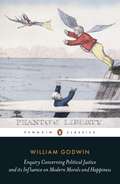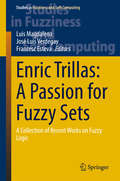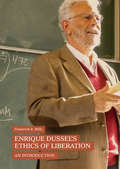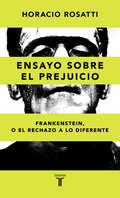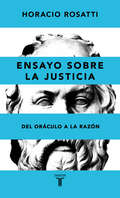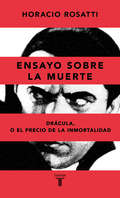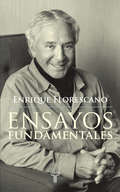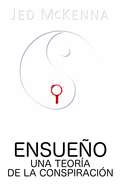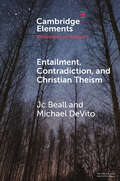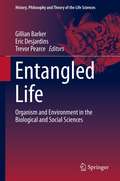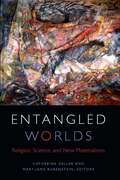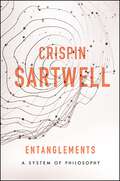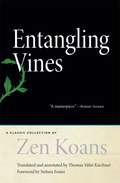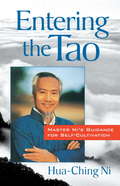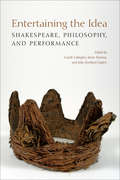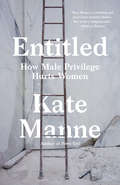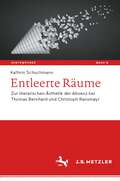- Table View
- List View
Enlightenment and Revolution: The Making of Modern Greece
by Paschalis M. KitromilidesGreece sits at the center of a geopolitical storm that threatens the stability of the European Union. To comprehend how this small country precipitated such an outsized crisis, it is necessary to understand how Greece developed into a nation in the first place, Paschalis Kitromilides contends. "Enlightenment and Revolution" identifies the intellectual trends and ideological traditions that shaped a religiously defined community of Greek-speaking people into a modern nation-state--albeit one in which antiliberal forces have exacted a high price. Kitromilides takes in the vast sweep of the Greek Enlightenment in the eighteenth and nineteenth centuries, assessing key developments such as the translation of Voltaire, Locke, and other modern authors into Greek; the conflicts sparked by the Newtonian scientific revolution; the rediscovery of the civilization of classical Greece; and the emergence of a powerful countermovement. He highlights Greek thinkers such as Voulgaris and Korais, showing how these figures influenced and converged with currents of the Enlightenment in the rest of Europe. In reconstructing this history, Kitromilides demonstrates how the confrontation between Enlightenment ideas and Church-sanctioned ideologies shaped the culture of present-day Greece. When the Greek nation-state emerged from a decade-long revolutionary struggle against the Ottoman Empire in the early nineteenth century, the Enlightenment dream of a free Greek polity was soon overshadowed by a romanticized nationalist and authoritarian vision. The failure to create a modern liberal state at that decisive historic moment, Kitromilides insists, is at the root of Greeces recent troubles.
Enlightenment on the Eve of Revolution: The Egyptian and Syrian Debates
by Elizabeth Suzanne KassabDuring the two decades that preceded the 2011 revolutions in Egypt and Syria, animated debates took place in Cairo and Damascus on political and social goals for the future. Egyptian and Syrian intellectuals argued over the meaning of tanwir, Arabic for “enlightenment,” and its significance for contemporary politics. They took up questions of human dignity, liberty, reason, tolerance, civil society, democracy, and violence. In Enlightenment on the Eve of Revolution, Elizabeth Suzanne Kassab offers a groundbreaking analysis of the tanwir debates and their import for the 2011 uprisings.Kassab locates these debates in their local context as well as in broader contemporary political and intellectual Arab history. She argues that the enlightenment they advocated was a form of political humanism that demanded the right of free and public use of reason. By calling for the restoration of human dignity and seeking a moral compass in the wake of the destruction wrought by brutal regimes, they understood tanwir as a humanist ideal. Kassab connects their debates to the Arab uprisings, arguing that their demands bear a striking resemblance to what was voiced on the streets of Egypt and Syria in 2011. Enlightenment on the Eve of Revolution is the first book to document these debates for the Anglophone audience and to analyze their importance for contemporary Egyptian and Syrian intellectual life and politics.
Enlightenment's Reformation: Religion and Philosophy in Germany, 1750–1830 (Ideas in Context)
by Michael PrintyHow did we get from the religious core of the sixteenth-century Reformation to the notions of freedom popularised by Hegel and Ranke? Enlightenment's Reformation explores how two key cultural and intellectual achievements – the sixteenth-century Reformation and the late eighteenth-century birth of 'German' philosophy – became fused in public discussion over the course of the 'long' eighteenth century. Michael Printy argues that Protestant theologians and intellectuals recast the meaning of Protestantism as part of a wide-ranging cultural apology aimed at the twin threats of unbelief and deism on the one hand, and against Pietism and a nascent evangelical awakening on the other. The reimagining of the Reformation into a narrative of progress was powerful, becoming part of mainstream German intellectual culture in the early decades of the nineteenth century. Utilising Reformation history, Enlightenment history, and German philosophy, this book explores how the rich if unstable idea linking Protestantism and modern freedom came to dominate German intellectual culture until the First World War.
Enlivenment: Toward a Poetics for the Anthropocene (Untimely Meditations #16)
by Andreas WeberA new understanding of the Anthropocene that is based on mutual transformation with nature rather than control over nature. We have been told that we are living in the Anthropocene, a geological era shaped by humans rather than by nature. In Enlivenment, German philosopher Andreas Weber presents an alternative understanding of our relationship with nature, arguing not that humans control nature but that humans and nature exist in a commons of mutual transformation. There is no nature–human dualism, he contends, because the fundamental dimension of existence is shared in what he calls "aliveness." All subjectivity is intersubjectivity. Self is self-through-other. Seeing all beings in a common household of matter, desire, and imagination, an economy of metabolic and economic transformation, is “enlivenment.” This perspective allows us to move beyond Enlightenment-style thinking that strips material reality of any subjectivity.To take this step, Weber argues, we need to supplant the concept of techné with the concept of poiesis as the element that brings forth reality. In a world not divided into things and ideas, culture and nature, reality arises from the creation of relationships and continuous fertile transformations; any thinking in terms of relationships comes about as a poetics. The self is always a function of the whole; the whole is equally a function of the individual. Only this integrated freedom allows humanity to reconcile with the natural world.This first English edition of Enlivenment has been expanded and updated from the German edition.
Enough: How your food choices will save the planet
by Dr Cassandra Coburn***'An astonishing accomplishment that might be the most important book we ever read, it will change the way you look at what we eat forever.' - Dr Max Pemberton'A wonderfully written guide for anyone who wants to eat better and save the world at the same time. Essential reading for anyone who cares about the planet.' - Thomasina MiersHow changing what you eat can save the planetOur food production systems are the single biggest cause of environmental change, while diseases linked to our eating habits are at epidemic levels and increasing. Enough. uses the latest scientific research to address this vital question: can we provide a growing population with a healthy diet from sustainable food systems? Fortunately for us all, the answer is yes. Enough. shows exactly how we can tackle both of these urgent, interconnected challenges at the same time. Using a seminal piece of research published in 2019, the Planetary HealthDiet (PHD), Dr Coburn reveals the hidden consequences of our food choices, and how we can easily make changes which are better for ourselves and the planet. She details which food groups we should be eating, which we should avoid - and why. Changing our way of eating is something that every one of us has the power to do. Enough. is a clear, ultimately hopeful and hugely important roadmap for both own health - and the planet's.
Enough: How your food choices will save the planet
by Dr Cassandra Coburn***'An astonishing accomplishment that might be the most important book we ever read, it will change the way you look at what we eat forever.' - Dr Max Pemberton'A wonderfully written guide for anyone who wants to eat better and save the world at the same time. Essential reading for anyone who cares about the planet.' - Thomasina MiersHow changing what you eat can save the planetOur food production systems are the single biggest cause of environmental change, while diseases linked to our eating habits are at epidemic levels and increasing. Enough. uses the latest scientific research to address this vital question: can we provide a growing population with a healthy diet from sustainable food systems? Fortunately for us all, the answer is yes.Enough. shows exactly how we can tackle both of these urgent, interconnected challenges at the same time. Using a seminal piece of research published in 2019, the Planetary HealthDiet (PHD), Dr Coburn reveals the hidden consequences of our food choices, and how we can easily make changes which are better for ourselves and the planet. She details which food groups we should be eating, which we should avoid - and why. Changing our way of eating is something that every one of us has the power to do. Enough. is a clear, ultimately hopeful and hugely important roadmap for both own health - and the planet's.
Enough: How your food choices will save the planet
by Dr Cassandra CoburnWe produce and eat unhealthy food, killing ourselves and the planet in the process. Food production systems are the single biggest cause of environmental change to the planet. And the food we are producing is killing us - more than a quarter of the world's population is overweight or obese, and deaths from stroke, heart attack, cancer, diabetes etc are at epidemic levels. It's easy to feel helpless. In 2019 a seminal piece of research was published which, for the first time, made clear recommendations for a way to produce food and to eat that would save both the planet's resources and our own health. The Planetary Health Diet was the culmination of years of research by 37 eminent scientists of various backgrounds into this question - can we provide a growing population with a healthy diet from sustainable food systems? The answer is yes. Enough is a practical explanation of the Planetary Health Diet's research, allowing everyone to understand the science and to adopt its recommendations in our daily lives. The PHD specifies the food groups we should be eating. But what does a diet composed of, for example, 30% carbohydrates really look like? Which carbs, exactly? The diet is largely plant-based but does encompass meat and fish - but how many servings? It also explains what the nine 'planetary boundaries' are, that our food production systems must not exceed - from the quantities of nitrogen and phosphorus in the ecosystem to freshwater use. As a scientist and journalist Dr Cassandra Coburn is brilliantly placed to provide this clear, ultimately hopeful and hugely important roadmap for own future health, and that of the planet. (p) 2021 Octopus Publishing Group
Enough: Staying Human in an Engineered Age
by Bill MckibbenWe are on the verge of crossing the line from born to made, from created to built. Sometime in the next few years, a scientist will reprogram a human egg or sperm cell, spawning a genetic change that could be passed down into eternity. We are sleepwalking toward the future, argues Bill McKibben, and it's time to open our eyes. In "The End of Nature", nearly fifteen years ago, McKibben demonstrated that humanity had begun to irrevocably alter--and endanger--our environment on a global scale. Now he turns his eye to an array of technologies that could change our relationship not with the rest of nature but with ourselves. He explores the frontiers of genetic engineering, robotics, and nanotechnology--all of which we are approaching with astonishing speed--and shows that each threatens to take us past a point of no return. We now stand at a critical threshold, poised between the human past and a post-human future. Ultimately, McKibben offers a celebration of what it means to be human, and a warning that we risk the loss of all meaning if we step across the threshold. His wise and eloquent book argues that we cannot forever grow in reach and power--that we must at last learn how to say, 'Enough.'
Enquiry Concerning Political Justice: And Its Influence On Morals And Happiness
by William GodwinOne of the great polemics and the key founding anarchist text, Godwin's Enquiry is his major work of political philosophy.Enquiry Concerning Political Justice established William Godwin as the chief exponent of British radicalism, in the tradition of the French Revolution. In it, he criticizes the 'brute engine' of government for systematizing oppression of individual liberty in the name of law and order, and calls for the abolition of all forms of rule and for the institution of an anarchist society based on the principles of simplicity, sincerity and equality. His book influenced everyone from Shelley and Coleridge (who revered him) to Thomas Malthus (who wrote his Essay on the Principle of Population in outraged response to him). The book's ideas would later echo through the writings of thinkers as diverse as Proudhon, Kropotkin, Marx and Thoreau, and it remains one of the great polemics of political literature.William Godwin, the famous philosopher and novelist, was born in East Anglia in 1756. The son of a Presbyterian minister, he was educated to follow in his father's footsteps, but subsequently lost his faith in God. He then devoted himself to writing, expounding his enlightenment and anarchist ideals in novels and essays. In 1797 he married Mary Wollstonecraft, the famous feminist; their daughter would grow up to be Mary Shelley, the author of Frankenstein. Godwin died in 1836. Isaac Kramnick is the Richard J. Schwartz Professor of Government at Cornell where he has taught since 1972. He has written or edited some twenty books among which his Bolingbroke and His Circle: The Politics of Nostalgia in the Age of Walpole won the Conference of British Studies Prize for best book on British politics.
Enric Trillas: A Passion for Fuzzy Sets
by Luis Magdalena José Luis Verdegay Francesc Esteva(Preliminary) The book is a comprehensive collection of the most recent and significant research and applications in the field of fuzzy logic. It covers fuzzy structures, systems, rules, operations as well as important applications, e. g in decision making, environmental prediction and prevention, and communication. It is dedicated to Enric Trillas as an acknowledgement for his pioneering research in the field. The book include a foreword by Lotfi A. Zadeh.
Enrique Dussel’s Ethics of Liberation: An Introduction
by Frederick B. MillsThis book introduces the methodology and basic concepts of Dussel’s ethics of liberation. Enrique Dussel is one of the principal founders of the philosophy of liberation in Latin America. Frederick B. Mills discusses how, for Dussel, we can realize our co-responsibility for human life by responding, in accord with ethical principles, to the appeals of victims of the prevailing capital system. Mills shows how these principles, when subsumed in the political and economic fields, aim at overcoming the ongoing assault on human life and nature and provide a moral compass for forging a path to liberation. He makes the case that the study of Dussel is critical to the understanding of liberatory thought in Latin America today. This book aims to introduce the ethics of liberation to a broader audience in the Global North where Dussel's ideas are urgently relevant to progressive political and economic theory and praxis.
Ensayo sobre el prejuicio: Frankenstein, o el rechazo a lo diferente
by Horacio RosattiA través de un análisis minucioso en torno a la figura del monstruo nacido de la imaginación de Mary Shelley, este ensayo aborda el prejuicio ético que surge de la mirada estética, es decir, aquel que asimila lo bueno con lo bello y lo malo con lo diferente, lo marginal o lo desconocido. ¿Por qué tildamos malo o peligroso aquello que nos resulta feo, diferente o marginal, mientras que asumimos como valioso lo que goza de una apariencia agradable? Horacio Rosatti pone la lupa sobre el prejuicio, esa complejidad que revela nuestras contradicciones y nos impulsa a imaginar una sólida relación entre la moral y la estética. Y elige al monstruo creado por Mary Shelley como espejo capaz de cristalizar todos los sentidos de esa siniestra vinculación. Las hipocresías de la mirada social, el dificultoso proceso de adaptación de la criatura a un mundo de "distintos", las versiones cinematográficas y los productos de consumo mediante los cuales la sociedad ha procesado su existencia son algunos de los temas que analiza este ensayo fascinante, calibrado y provocador. En palabras del autor: "El monstruo siempre será un espejo. Aunque se trata de un espejo que refleja no solo lo que se ve, sino también lo que no se percibe a simple vista, lo que está escondido dentro de nosotros".
Ensayo sobre la justicia: Del oráculo a la razón
by Horacio RosattiAsistiremos al lugar y el momento exactos en que la consideración de la idea de justicia experimenta un giro radical y fundante en la historia de Occidente: de destino inexorable impuesto por los dioses a deliberación racional enteramente humana. La más singular perspectiva para recorrer uno de los conceptos de mayor relevancia de nuestra vida. Este libro nos sitúa en el lugar y el momento exactos en que la consideración de la idea de justicia experimenta un giro radical y fundante en la historia de Occidente: de destino inexorable impuesto por los dioses a deliberación racional enteramente humana. A fin de explorar la relación entre libertad, desobediencia y responsabilidad, el autor recobra las incómodas preguntas que tanto Antígona como Sócrates -dispuestos ambos a sacrificar su propia vida para sostener principios que estiman valiosos- se formulan sobre su circunstancia, preguntas que agrietan la idea de justicia de su época y que resuenan aun en la actualidad: ¿Qué tan libres somos para responder por nuestros actos? ¿Cuánto margen tenemos para desobedecer una ley que creemos injusta? ¿Qué relación existe entre la justicia y la verdad? Tercer y último volumen de la trilogía escrita para Taurus por Horacio Rosatti, Ensayo sobre la justicia ofrece la más singular perspectiva para recorrer uno de los conceptos de mayor relevancia de nuestra vida.
Ensayo sobre la muerte: Drácula, o el precio de la inmortalidad
by Horacio RosattiA partir de la figura de Drácula y sus diversas representaciones, este riquísimo ensayo explora las inquietudes sociales y culturales en torno al tema de la muerte; recobra los aportes de la filosofía, el derecho, la ciencia y el arte; plantea los caminos por los que hoy discurre la búsqueda de la inmortalidad y reflexiona sobre la incidencia de la tecnología en el logro de una vida humana cada vez más extensa. «Me enseñáis que este universo prestigioso y abigarrado se reduce al átomo, y que el átomo se reduce al electrón. Las líneas suaves de estas colinas y la mano del crepúsculo sobre este corazón agitado me enseñan mucho más.»Albert Camus, El mito de Sísifo El avance de la ciencia ha extendido el promedio de vida a niveles impensados. Paradójicamente, nuestros miedos se han desplazado del temor a la muerte al temor a los inconvenientes que nos depararía una existencia demasiado prolongada. ¿Habrá muerte en el futuro? ¿Es cierto que viviremos doscientos años? ¿Cómo será esa vida? ¿Podrá ser conjurada virtualmente la ausencia física de los seres que se han ido? ¿Qué significa hoy morir? ¿No respirar, no sentir, no pensar? Horacio Rosatti centra el análisis en la figura espectral del vampiro, ese ícono contemporáneo de la literatura y el cine capaz de subvertir los límites de lo biológico y lo moral que encarnaría tanto el miedo a la muerte como a la inmortalidad. La ausencia de un cuerpo que pueda reflejarse en el espejo o exponerse a la luz del día ¿no es, en su caso, el precio de vivir por siempre? Este riquísimo ensayo explora las inquietudes sociales y culturales en torno al tema de la muerte; recobra los aportes de la filosofía, el derecho, la ciencia y el arte; plantea los caminos por los que hoy discurre la búsqueda de la inmortalidad y reflexiona sobre la incidencia de la tecnología en el logro de una vida humana cada vez más extensa.
Ensayos fundamentales
by Enrique Florescano Francisco EissaEste libro homenaje recoge ocho ensayos esenciales del Dr. Enrique Florescano, renovador de la investigación histórica en México, que van desde su aproximación a los problemas agrarios de México, su investigación sobre la memoria mexicana y los mitos fundadores, hasta su reflexión sobre la historia como disciplina y el papel social del historiador.
Ensueño. Una Teoría de la Conspiración
by Marisa Gonzalez Aguiar Jed McKennaSi la vida no es más que sueño, ¿a qué nos despertamos? La premisa central de Ensueño: Una Teoría de la Conspiración, es la verdaderamente ridícula pero indisputable afirmación de que el universo no existe. Esto es algo que se puede entender conceptualmente, como mirar un documental acerca de la Antártica, o experimentalmente, como mudarse a la Antártica. También existe un fenómeno relacionado en el cual te duermes mirando el documental y te despiertas en el páramo congelado. Eso debe ser extraño, pero la verdad es que estás dormido en un páramo desértico soñando que no lo estás, y eso es lo que te sucede cuando te despiertas.
Entailment, Contradiction, and Christian Theism (Elements in the Philosophy of Religion)
by Jc Beall Michael DeVitoApparent contradiction is common in traditional monotheism, and perhaps especially so in standard Christian theology given central doctrines such as the incarnation and trinity. This Element aims to chart out a very elementary but abstract framework through which such contradictions may be approached. This Element does not attempt to address the many options for thinking about contradictions in the face of logical entailment; it charts only a few salient abstract options.
Entangled Life: Organism and Environment in the Biological and Social Sciences
by Gillian Barker Eric Desjardins Trevor PearceThis volume explores the interactions between organisms and their environments and how this "entanglement" is a fundamental aspect of all life. It brings together the work and ideas of historians, philosophers, biologists, and social scientists, uniting a range of new perspectives, methods, and frameworks for examining and understanding the ways that organisms and environments interact. The volume is organized into three main sections: historical perspectives, contested models, and emerging frameworks. The first section explores the origins of the modern idea of organism-environment interaction in the mid-nineteenth century and its development by later psychologists and anthropologists. In the second section, a variety of controversial models--from mathematical representations of evolution to model organisms in medical research--are discussed and reframed in light of recent questions about the interplay between organisms and environment. The third section investigates several new ideas that have the potential to reshape key aspects of the biological and social sciences. Populations of organisms evolve in response to changing environments; bodies and minds depend on a wide array of circumstances for their development; cultures create complex relationships with the natural world even as they alter it irrevocably. The chapters in this volume share a commitment to unraveling the mysteries of this entangled life.
Entangled Worlds: Religion, Science, and New Materialisms (Transdisciplinary Theological Colloquia)
by Catherine Keller and Mary-Jane RubensteinHistorically speaking, theology can be said to operate “materiaphobically.” Protestant Christianity in particular has bestowed upon theology a privilege of the soul over the body and belief over practice, in line with the distinction between a disembodied God and the inanimate world “He” created. Like all other human, social, and natural sciences, religious studies imported these theological dualisms into a purportedly secular modernity, mapping them furthermore onto the distinction between a rational, “enlightened” Europe on the one hand and a variously emotional, “primitive,” and “animist” non-Europe on the other. The “new materialisms” currently coursing through cultural, feminist, political, and queer theories seek to displace human privilege by attending to the agency of matter itself. Far from being passive or inert, they show us that matter acts, creates, destroys, and transforms—and, as such, is more of a process than a thing. Entangled Worlds examines the intersections of religion and new and old materialisms. Calling upon an interdisciplinary throng of scholars in science studies, religious studies, and theology, it assembles a multiplicity of experimental perspectives on materiality: What is matter, how does it materialize, and what sorts of worlds are enacted in its varied entanglements with divinity? While both theology and religious studies have over the past few decades come to prioritize the material contexts and bodily ecologies of more-than-human life, Entangled Worlds sets forth the first multivocal conversation between religious studies, theology, and the body of “the new materialism.” Here disciplines and traditions touch, transgress, and contaminate one another across their several carefully specified contexts. And in the responsiveness of this mutual touching of science, religion, philosophy, and theology, the growing complexity of our entanglements takes on a consistent ethical texture of urgency.
Entanglements: A System of Philosophy (SUNY series in American Philosophy and Cultural Thought)
by Crispin SartwellA work of maximally ambitious scope with a foundation in humility, Entanglements sets out a philosophical system of the sort rarely seen over the past century. In a discipline marked by greater and greater specialization and the narrowing of increasingly insular traditions and approaches, Crispin Sartwell has spent his career engaging widely across philosophical topics and texts. Here he brings together his philosophical positions in a unified system that is coherent across the issues and subdisciplines in the field. In addition to presenting his own theories of truth, knowledge, free will, beauty, and the political state, Sartwell's criticisms of other figures and movements provide an overview of the history of philosophy. The project of presenting an overarching philosophical system is a resolutely old-fashioned one, and in undertaking it, Sartwell is not only encapsulating an extraordinarily unique and productive career but also nudging philosophy back to its broader aims of explaining the world and our place in it.
Entangling Vines
by Thomas Yuho Kirchner Ueda Shizuteru Nelson FosterEntangling Vines, a translation of the Shumon kattoshu, is one of the few major koan texts to have been compiled in Japan rather than China. Indeed, Kajitani Sonin (1914 - 95), former chief abbot of Shokoku-ji and author of an annotated, modern-Japanese translation of the Kattoshu, commented that 'herein are compiled the basic Dharma materials of the koan system." Most of the central koans of the contemporary Rinzai koan curriculum are contained in this work. A distinctive feature of Entangling Vines is that, unlike The Gateless Gate and Blue Cliff Record, it presents the koans "bare," with no introductions, commentaries, or verses. Its straightforward structure lends the koans added force and immediacy, emphasizing the Great Matter, the essential point to be interrogated, and providing ample material for the rigors of examining and refining Zen experience. Containing 272 cases and extensive note material, the collection is indispensable for serious koan training and will also be of interest for anyone drawn to Zen literature. The present translation had its origins in the discussions between three forward-looking modern Japanese Zen masters and Thomas Kirchner, an experienced Zen monk from America. And Kirchner's careful annotation of each koan makes this a brilliant introduction to Buddhist philosophy.
Entering the Tao: Master Ni's Guidance for Self-Cultivation
by Hua-Ching Ni"Master Hua-Ching Ni uses straightforward language and personal experiences, as well as traditional stories and teachings of the ancient masters, to impart the wisdom of Taoism, the Integral Way. His teachings promote a simple, natural, healthy, and happy way of life that lays the foundation for spiritual self-cultivation. Master Ni emphasizes that it is important first to establish a good understanding of basic spiritual principles and then begin to realize this wisdom in daily life by adopting practices and attitudes that help to conserve, nourish, and refine the subtle energy. Among the topics he discusses in short, accessible passages are: * Basic spiritual self-protection *
Entertaining the Idea: Shakespeare, Performance, and Philosophy (UCLA Clark Memorial Library Series)
To entertain an idea is to take it in, pay attention to it, give it breathing room, dwell with it for a time. The practice of entertaining ideas suggests rumination and meditation, inviting us to think of philosophy as a form of hospitality and a kind of mental theatre. In this collection, organized around key words shared by philosophy and performance, the editors suggest that Shakespeare’s plays supply readers, listeners, viewers, and performers with equipment for living. In plays ranging from A Midsummer Night’s Dream to King Lear and The Winter’s Tale, Shakespeare invites readers and audiences to be more responsive to the texture and meaning of daily encounters, whether in the intimacies of love, the demands of social and political life, or moments of ethical decision. Entertaining the Idea features established and emerging scholars, addressing key words such as role play, acknowledgment, judgment, and entertainment as well as curse and care. The volume also includes longer essays on Shakespeare, Kant, Husserl, and Hegel as well as an afterword by theatre critic Charles McNulty on the philosophy and performance history of King Lear.
Entitled: How Male Privilege Hurts Women
by Kate ManneAn urgent exploration of men&’s entitlement and how it serves to police and punish women, from the acclaimed author of Down Girl&“Kate Manne is a thrilling and provocative feminist thinker. Her work is indispensable.&”—Rebecca Traister NAMED ONE OF THE BEST BOOKS OF THE YEAR BY THE ATLANTIC In this bold and stylish critique, Cornell philosopher Kate Manne offers a radical new framework for understanding misogyny. Ranging widely across the culture, from Harvey Weinstein and the Brett Kavanaugh hearings to &“Cat Person&” and the political misfortunes of Elizabeth Warren, Manne&’s book shows how privileged men&’s sense of entitlement—to sex, yes, but more insidiously to admiration, care, bodily autonomy, knowledge, and power—is a pervasive social problem with often devastating consequences. In clear, lucid prose, Manne argues that male entitlement can explain a wide array of phenomena, from mansplaining and the undertreatment of women&’s pain to mass shootings by incels and the seemingly intractable notion that women are &“unelectable.&” Moreover, Manne implicates each of us in toxic masculinity: It&’s not just a product of a few bad actors; it&’s something we all perpetuate, conditioned as we are by the social and cultural mores of our time. The only way to combat it, she says, is to expose the flaws in our default modes of thought while enabling women to take up space, say their piece, and muster resistance to the entitled attitudes of the men around them. With wit and intellectual fierceness, Manne sheds new light on gender and power and offers a vision of a world in which women are just as entitled as men to our collective care and concern.
Entleerte Räume: Zur literarischen Ästhetik der Absenz bei Thomas Bernhard und Christoph Ransmayr (Kontemporär. Schriften zur deutschsprachigen Gegenwartsliteratur #9)
by Kathrin SchuchmannVorstellungen von Absenz wirken in der Gegenwart auf breiter Basis – auch in der Literatur. Doch wie sind diese medial vermittelt? Geht man davon aus, dass Absenz-Phänomene sich nicht in einer primordialen Leere ereignen, sondern dass ihnen eher mit Vorstellungen vom Unbestimmten, Unverfügbaren und Möglichen beizukommen ist, rücken Verräumlichungsformen in den Fokus, die bewegungslogisch zu erklären sind. Um das intrikate Verhältnis von Möglichkeitsformen und ‚Wirklichkeit‘ innerhalb der Grenzen des Sagbaren zu verhandeln, begegnen ihm Thomas Bernhards und Christoph Ransmayrs Erzähltexte mit Verfahren der Verräumlichung. Aus der Perspektive einer Ästhetik der Absenz poetisieren diese Erzähltexte Wahrnehmungsschwellen, indem sie Abwesendes textphänomenal verräumlichen, es jedoch nicht im (topo-)graphischen containment absichern, sondern eine Topologie eröffnen, die auf Strategien des displacement setzt. Die Studie führt raumtheoretische Ansätze unter einer differenztheoretischen Perspektive mit einem Konzept von Virtualität zusammen, um literarische Verfahren der Verräumlichung von Absenz in Erzähltexten von Bernhard und Ransmayr zu untersuchen.

